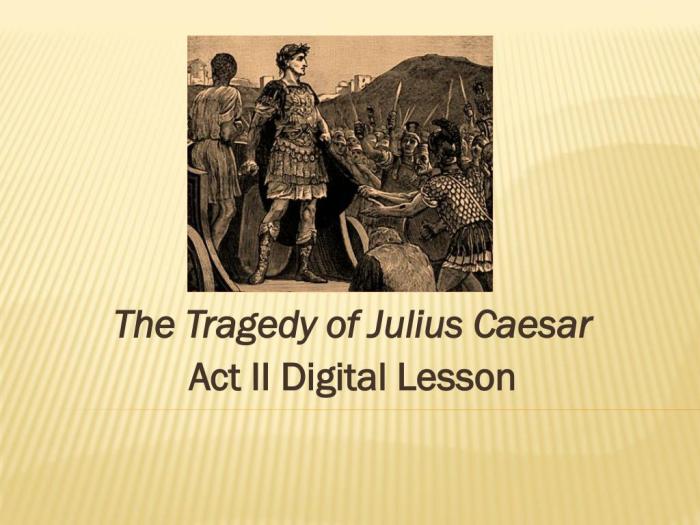The Tragedy of Julius Caesar Part 5: Developing Central Ideas delves into the intricate tapestry of Shakespeare’s masterpiece, exploring the play’s multifaceted characters, timeless themes, and enduring legacy.
Through a comprehensive analysis of character motivations, dramatic structure, and historical context, this discussion unveils the profound insights and enduring relevance of this literary classic.
Character Analysis

Julius Caesar
Julius Caesar is a complex and multifaceted character who embodies both the virtues and vices of a great leader. He is a brilliant military strategist and a charismatic politician, but he is also arrogant and ambitious. Caesar’s desire for power ultimately leads to his downfall, as he underestimates the threat posed by his enemies.
Brutus
Brutus is a noble and idealistic Roman who is torn between his loyalty to Caesar and his love for his country. He ultimately chooses to betray Caesar in the belief that it is the best way to protect Rome. However, Brutus is too naive to realize that his actions will lead to civil war.
Cassius
Cassius is a cunning and ambitious politician who manipulates Brutus into joining his conspiracy against Caesar. He is motivated by a desire for power and a hatred of Caesar’s tyranny. Cassius is ultimately killed by Brutus, but his influence continues to shape the course of events.
Antony
Antony is a loyal friend and supporter of Caesar. He is a skilled orator and a charismatic leader. After Caesar’s death, Antony uses his influence to rally the Roman people against Brutus and Cassius. Antony is ultimately victorious in the civil war and becomes the first emperor of Rome.
Portia and Calpurnia
Portia and Calpurnia are the wives of Brutus and Caesar, respectively. They are both strong and independent women who play important roles in the play. Portia is a loyal and supportive wife who tries to persuade Brutus to abandon his conspiracy.
Calpurnia is a devoted wife who tries to warn Caesar of the danger he is in.
Themes and Motifs

Ambition
Ambition is a central theme in The Tragedy of Julius Caesar. Caesar’s ambition to become emperor of Rome leads to his downfall. Brutus’s ambition to protect Rome from Caesar’s tyranny leads him to betray his friend. Cassius’s ambition for power leads him to manipulate Brutus into joining his conspiracy.
Betrayal
Betrayal is another central theme in the play. Brutus betrays Caesar by joining the conspiracy against him. Antony betrays Brutus by rallying the Roman people against him. The play explores the devastating consequences of betrayal and the importance of loyalty.
Power
Power is a third central theme in the play. Caesar’s desire for power leads to his downfall. Brutus’s attempt to protect Rome from Caesar’s tyranny leads to civil war. The play explores the corrupting influence of power and the importance of using power responsibly.
Omens, Dreams, and Prophecies
The play is filled with omens, dreams, and prophecies that foreshadow Caesar’s death and the civil war that follows. These supernatural elements create a sense of foreboding and inevitability. They also suggest that the characters are not in control of their own destinies and that their actions are ultimately shaped by fate.
Political and Social Context
The play is set during a time of political and social upheaval in Rome. The Roman Republic is in decline, and Caesar’s rise to power threatens to destroy the republic altogether. The play explores the tensions between individual ambition and the common good.
It also examines the dangers of tyranny and the importance of preserving democracy.
Dramatic Structure
Structure
The play is divided into five acts and twenty-three scenes. The first act introduces the characters and sets up the conflict. The second act focuses on the conspiracy against Caesar. The third act depicts Caesar’s assassination and the aftermath. The fourth act shows the civil war between Brutus and Antony.
The fifth act concludes with the defeat of Brutus and the rise of Antony as emperor.
Foreshadowing, Irony, and Suspense
Shakespeare uses a variety of techniques to create foreshadowing, irony, and suspense in the play. Foreshadowing is used to hint at events that will happen later in the play. Irony is used to create a sense of contrast between what is expected and what actually happens.
Suspense is used to keep the audience on the edge of their seats.
Impact of Structure
The play’s structure contributes to its overall impact by creating a sense of inevitability and tragedy. The audience knows from the beginning that Caesar will be assassinated and that the republic will be destroyed. This knowledge creates a sense of suspense and foreboding.
The play’s structure also highlights the characters’ flaws and their inability to control their own destinies.
Language and Style: The Tragedy Of Julius Caesar Part 5: Developing Central Ideas
Rhetorical Devices
Shakespeare uses a variety of rhetorical devices in the play, including metaphors, similes, and allusions. These devices help to create vivid imagery, emphasize important themes, and develop the characters.
Iambic Pentameter
The play is written in iambic pentameter, a type of meter that consists of ten syllables per line, with the stress falling on every other syllable. Iambic pentameter creates a sense of rhythm and flow in the play’s language.
Impact of Language
The play’s language is rich and complex, and it helps to create the play’s tragic atmosphere. The use of rhetorical devices and iambic pentameter creates a sense of beauty and elegance, even as the characters are grappling with difficult moral choices.
Historical and Cultural Context

Historical Context
The play is based on historical events that took place in Rome in 44 BC. Julius Caesar was a real historical figure who was assassinated by a group of senators led by Brutus and Cassius. The assassination led to a civil war that ultimately resulted in the rise of Antony as emperor.
Influence of Roman History and Culture
Shakespeare’s play is heavily influenced by Roman history and culture. The play’s characters, setting, and themes are all drawn from Roman sources. Shakespeare’s play also reflects the Elizabethan era’s fascination with Roman history and culture.
Relevance to Contemporary Audiences
The play continues to be relevant to contemporary audiences because it explores universal themes such as ambition, betrayal, and power. The play also provides insights into the human condition and the challenges of living in a complex and often unjust world.
Adaptations and Interpretations
Adaptations
The play has been adapted into numerous films, television shows, and operas. Some of the most notable adaptations include:
- Julius Caesar(1953 film starring Marlon Brando)
- Julius Caesar(1979 BBC television series starring Richard Pasco)
- Julius Caesar(2005 opera by Philip Glass)
Interpretations
The play has been interpreted in a variety of ways over the centuries. Some directors have emphasized the play’s political themes, while others have focused on its psychological or philosophical aspects. The play’s characters have also been interpreted in a variety of ways.
For example, some directors have portrayed Brutus as a noble hero, while others have seen him as a tragic figure.
Enduring Legacy, The tragedy of julius caesar part 5: developing central ideas
The play continues to be performed and studied today because it is a timeless classic that explores universal themes and characters. The play’s enduring legacy is a testament to its power and relevance.
FAQ Overview
What are the central themes of The Tragedy of Julius Caesar?
The play explores themes of ambition, betrayal, power, and the conflict between public duty and personal ambition.
How does Shakespeare use dramatic structure to enhance the play’s impact?
The play’s five acts and scenes, along with the use of foreshadowing, irony, and suspense, create a dynamic and engaging narrative that builds tension and drives the plot.
What is the significance of the play’s historical context?
The play’s setting in ancient Rome provides a backdrop for exploring timeless themes of political power, ambition, and the consequences of betrayal.